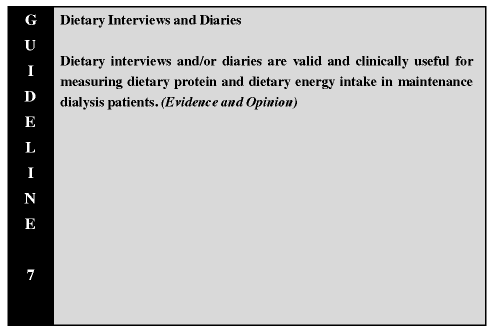
1. Evaluation of Protein-Energy Nutritional Status

Patients undergoing MHD or CPD frequently have low protein and energy intake. Evidence indicates that for patients ingesting low protein or energy intakes, increasing dietary protein or energy intake improves nutritional status.57-60 It is important, therefore, to monitor the dietary protein and energy intake of MHD and CPD patients. A number of studies in individuals without renal disease indicate that dietary diaries and interviews provide quantitative information concerning intake of protein, energy, and other nutrients.61,62 It is recommended, therefore, that individuals undergoing MHD or CPD periodically maintain 3-day dietary records followed by dietary interviews conducted by an individual trained in conducting accurate dietary interviews and calculating nutrient intake from the diaries and interviews, eg, a registered dietitian, preferably with experience in renal disease (see Appendices III and IV). When staffing conditions limit the time available to conduct more formal assessments of nutritional intake, a 24-hour dietary recall may be substituted for dietary interviews and/or diaries in nutritionally stable patients.
predictability of morbidity, mortality, or other clinical outcomes.